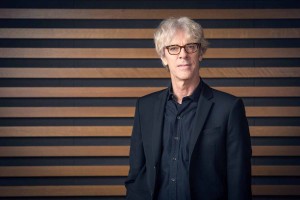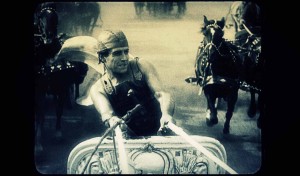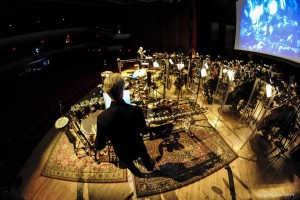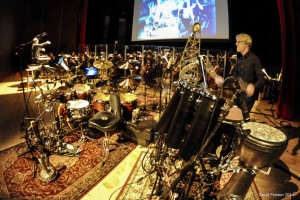
With a tour planned across Europe, a live arena spectacle of Ben Hur, which included the iconic chariot race and pirate battle, was being staged in 2009. Drummer and film composer Stewart Copeland (Wall Street, Rumble Fish) – drummer, film composer and founding member of The Police – was commissioned to write the music, which was pre-recorded in Eastern Europe and played back during the show.
As a film composer, Copeland has created music to go with visuals, but in the case of the live show, he had to write the score before the staging of the scenes. He stated that all he had to work with was the script, “A Roman cavalry troupe comes thundering onto the set. They beat up a bunch of Judeans. They drag off one guy. That’s the scene.”

“While I’m doing that, I’m laying down a kind of audio soundscape and building the music in with the narration and dialog elements,” explained Copeland. “I had to do it in my head. Of course when we’re actually rehearsing this thing with the music that I had written, changes had to be made. I had to rewrite a lot of stuff as the director worked the scenes.”
For instance, although the horse wrangler, who was slated to be the show’s chariot master, had estimated that it would take the chariots 27 seconds to do a lap – and Copeland wrote the music to that timing – when they got to the arena, he discovered that it only took 15 seconds to go around. The composer had to do a lot of adapting on the fly.
Eventually the show ran its course and left Copeland owning all the music. He had the idea to have an orchestral concert of the score with slides of chariots as visuals, but then discovered the 1920s classic. As he watched the movie, he realized he had the music to go with the film, but it would take two years to achieve his vision. Copeland first had to secure the rights to the film from Warner Bros. and get the “80-year-old celluloid” out of the vault to telecine it.
 “The old lady had not been out of her cans since the ’60s when they shot it to video,” shared Copeland. “They went down to the vault and pulled it out. It took 10 days to defrost and we telecined it to the latest modern standards. It just revealed itself.”
“The old lady had not been out of her cans since the ’60s when they shot it to video,” shared Copeland. “They went down to the vault and pulled it out. It took 10 days to defrost and we telecined it to the latest modern standards. It just revealed itself.”
Copeland saw the immense beauty of the film, but also the damage to the print. Having worked in postproduction for over 20 years, he tackled the editing himself, having finessed his cutting chops on the Sundance documentary Everyone Stares: The Police Inside Out that he created out of Super 8 footage shot during his years as a drummer for the band. Feeling that pacing would improve the cinematic storytelling of Ben Hur, he set out to cut down the original full-length version, taking the running time from 2:27 to 90 minutes.
Copeland did the restoration of the print by duplicating sections of frames to repair damaged parts, “It is still an old movie with lots of dust and scratches, but some of the most heinous crimes against the film were patched up.” Copeland had to return the blacks to true blacks without losing all the greys and the mid-tones. Essentially he had “to restore the film to its glory, which was a labor of love.”
 At the same time, the composer had to orchestrate and cut the music to fit the new picture, and cut the picture to fit the music that he had written, while keeping the intent of the film’s director intact. Even though he might have a perfect theme, he had to add bars and adjust the tempo in order for the music to work with the film, a process that he was familiar with as a film composer. In many ways it was more difficult than composing from scratch.
At the same time, the composer had to orchestrate and cut the music to fit the new picture, and cut the picture to fit the music that he had written, while keeping the intent of the film’s director intact. Even though he might have a perfect theme, he had to add bars and adjust the tempo in order for the music to work with the film, a process that he was familiar with as a film composer. In many ways it was more difficult than composing from scratch.
Talking about where he derives his inspiration Copeland revealed, “It starts, I guess, with an atmosphere, an orchestral template that defines the instruments and how you’re going to do this. Then the music, the tunes reveal themselves.”
The themes that Copeland created for the live spectacle were tailored to the atmosphere and purpose of those scenes, but because they were based upon the book, they were closely related to the scenes and themes in the film.
“It was pretty amazing how a jealousy theme, written for an arena show, works with that same storyline in a film made 80 years ago,” stated Copeland. “It was an amazing adventure.”
Performed with Copeland’s original score, the legendary film, Ben-Hur: A Tale of the Christ, will be screened on March 16 at 8 p.m. as part of the Valley Performing Arts Center’s 2016 season. The evening will feature Copeland on percussion, joined by the Pacific Symphony, conducted by Richard Kaufman, celebrating his 25th season as its principal pops conductor. Kaufman, a regional native, has received the distinguished alumni award from California State University, Northridge. Pacific Symphony will also present the film on its Pops series at the Renée and Henry Segerstrom Concert Hall in Costa Mesa, on March 18 and 19.
For more information, visit ValleyPerformingArtsCenter.org





